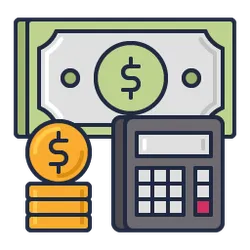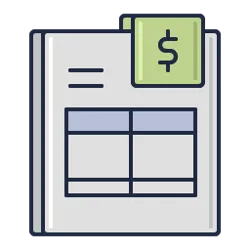When you’re looking into cash advances, you’re likely to see something called a cash advance fee. The merchant cash advance industry has changed rapidly as technology and online lending have improved over the years. Whether you’re a small business owner who can’t wait another day for loan approval or a recently laid-off worker in need of cash quickly, understanding what a cash advance fee is will help you determine whether or not it is a viable solution for you. However, you’re not alone. It’s estimated that 80% of small businesses in the United States are reliant on some form of credit.
So, with roughly 22 million American small business owners in the same position, it’s important to know about cash advances fees
How a Cash Advance Works

Simply put, a cash advance allows you to borrow money against your line of credit, personal property, or paycheck. Depending on the type, there’s typically no application to fill out, unlike a traditional loan process. It’s easy to get cash fast with this option.
There are a variety of cash advance types to consider before you take any action. Familiarizing yourself with these will help avoid any confusion in the long run.
If you’re a business owner who is struggling financially, it’s important to educate yourself and understand all of your options. Given the current climate with COVID-19, many businesses are struggling to pay their bills. Analyze your financial planning and budgeting strategy to see how a cash advance will affect your business in the future.
Merchant Cash Advance
The merchant cash advance is ideal for small businesses that process credit card transactions. After applying, the business owner will receive a sum of cash almost immediately. Repayment options vary by provider, however, daily repayment is the most common. This means every time a customer pays with their credit card, the owner and lender each receives a percentage of those sales until the advance is paid in full. This type of advance typically depends on credit card processing and can be set up with your existing merchant services provider.
It’s important to know interest rates may fluctuate depending on the provider, so, it’s vital to shop around for a trustworthy provider.
Credit Card Cash Advance
As the name implies, this is where a person borrows money from their personal line of credit. To request this type of advance, you can visit your nearest bank, go to an ATM, or use a convenience check.
If you choose to use an ATM, please note you’ll have to enter a PIN for your credit card. If you don’t have one, you’ll need to request one from your credit card issuer first.
Some credit card merchants provide their customers with convenience checks. If you have these, simply write a check to yourself and cash it. However, if you prefer to visit a bank in person, bring your credit card and request a cash advance from the teller.
It is important to understand the cons of this method. There is no grace period with a credit card advance, and there are high fees and often higher interest.
Direct Deposit Advance
While many banks have discontinued this service, direct deposit advances still do occur. In this scenario, a person will have their bank advance them an amount based on their typical direct deposit amount.
The fees are quite high with this type of advance which is why it is not often used.
Payday Loans
While cash advances are not actual loans, they do work in similar ways.
Payday lenders issue payday loans. They allow a person to borrow against their paycheck (typically anywhere from $50-$1000). It’s then expected that upon the next paycheck, the loan will be repaid in full.
If you choose to go this route, please note that in addition to high-interest rates, there will also be large fees associated with this type of transaction.
Installment Loans
This type of loan is secured by a borrower’s personal property. Installment loans allow a person to borrow money and repay it back in increments over a specific amount of time. This is a more long-term type of loan.
Installment loans are one of the more affordable options out there on the market for cash advances.
What is a Cash Advance Fee?
Each type of advance carries fees and/or high-interest rates. You may be asking yourself, “what is a cash advance fee?” and “how will it affect my business?” Don’t worry, we’re here to break down the elusive cash advance fee and your other options.
A cash advance fee is a fee charged by the lender for taking the risk associated with lending the money. Cash advance fees vary by lenders and the terms you agree to.
The Cost of a Cash Advance Fee
If you’re familiar with paying credit card processing fees, a cash advance fee should not be much of a shock to you. However, the rate of a cash advance fee depends on the amount you’re borrowing and the method your lender uses to calculate their fee.
It’s common for a credit card issuer to charge a flat fee or percentage based on the amount advanced. They will choose whichever is greater and assign that fee. You have the right to ask your issuer how they calculate their fees. This is usually found in your merchant agreement or account information
The typical fee for a cash advance is $15 per $100 borrowed. This is a relatively high amount and does not account for interest, which the borrower is responsible for on top of the repayment and fee.
Can You Avoid a Cash Advance Fee?
Unfortunately, there is no way to avoid a cash advance fee unless you simply decide not to get one. If you would like to minimize the cost of fees, you can do this by borrowing a smaller amount, as the fees are determined by the advance. Another way to reduce your cash advance fee is by shopping around for the best rate. Determine your top three lending options and go from there.
If a cash advance fee is deterring you from this financing option, consider an alternative way to acquire credit for your business.
Cash Advance Alternatives
Although cash advances can be an asset to your business in tough times, some individuals prefer alternative methods for financing their businesses. A cash advance fee is something worth weighing when seeking out a cash advance. If you come to the conclusion that a cash advance is not in your best interest, there are other options available to you.
Alternatives Available

- Retirement Account Loan. If you have a small business 401k plan you can withdraw funds from it early with a penalty. If you invest in a Roth IRA, you are able to access those funds at any time without penalty.
- Personal Loan. If you’re in a pinch and have an excellent credit score, interest rates for a personal loan are often lower than a cash advance. You’ll need to apply for the loan and go through an approval process, but the amount you can borrow is much higher than a cash advance can offer.
- Business Loan. While business loans require you to sign various documents and wait for approval, they often have lower interest rates. Businesses also have credit scores, so if you own an entity with a history of good credit, this may be a viable option for you.
- Pay Bills With a Credit Card. During times when money is tight, you can use a credit card to pay for bills and essentials which will free up the amount of available cash in your budget.
- Negotiate, Negotiate, Negotiate. If you have a good credit history, you can speak to your credit card providers and negotiate down the interest rates. Another point you can try and negotiate is a longer payment term or even a payment plan. In the end, communication with your provider will be key to coming up with a strategy where you can pay them back rather than default.
Is a Cash Advance Right For You?
Coming up with the capital to fund your business is an important step for any business owner. While there are many options out there for financing, each comes with its drawbacks. Cash advance fees are a necessary evil of quick approval and fast cash. If you find yourself in the position to borrow money quickly and are able to pay it off through regular credit card transactions, a cash advance fee should not be a deterrent. After all, it’s up to you to decide which option is right for your business.






